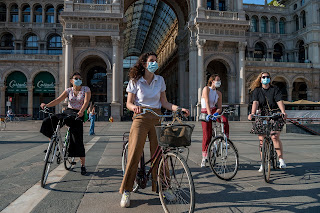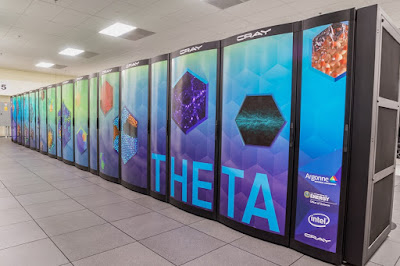 |
| People walk through Piazza Duomo in Milan on May 7th. Some restrictions were lifted this week in Italy.BY CARLO COZZOLI/SHUTTERSTOCK. |
Topics: Biology, COVID-19, Mathematical Models
Though I likely look like an alarmist to some of my neighbors and most of Greensboro, I will be wearing masks for the duration of this pandemic and the release of a vaccine under hopefully, a more functional administration in 2021.
“I felt like this was pretty urgent,” said De Kai, who was born in St. Louis, and is the son of immigrants from China. “I saw the country where I grew up, where my family lives [now mostly in the Bay Area], about to face this pandemic without knowing much about something as simple as wearing a mask to protect themselves and others.” In part, this comes from a cultural difference between East Asia, where masks have been routinely worn for decades to fend off pollution and germs, and other parts of the world. This includes the U.S., where people are unaccustomed to wearing masks, and, in the past, have sometimes been insensitive, even stigmatizing East Asians, many of whom had chosen to wear them in public prior to the pandemic, and had continued the practice in the aftermath of the SARS and MERS outbreaks. (In part, this habit was meant to show other people that they were concerned about transmitting the disease—something we in the West would do well to emulate.)
De Kai’s solution, along with his team, was to build a computer forecasting model they call the masksim simulator. This allowed them to create scenarios of populations like those in Japan (that generally wear masks) and others (that generally don’t), and to compare what happens to infection rates over time. Masksim takes sophisticated programming used by epidemiologists to track outbreaks and pathogens like COVID-19, Ebola, and SARS, and blended this with other models that are used in artificial intelligence to take into account the role of chance, in this case the randomness and unpredictability, of human behavior—for instance, when a person who is infected decides to go to a beach. De Kai’s team have also added some original programming that takes into account mask-specific criteria, such as how effective certain masks are at blocking the invisible micro-droplets of moisture that spray out of our mouths when we exhale or speak, or our noses when we sneeze, which scientists believe are significant vectors for spreading the coronavirus.
If 80% of Americans Wore Masks, COVID-19 Infections Would Plummet, New Study Says, David Ewing Duncan, Vanity Fair
Here's the ArXiv preprint paper to review. It takes ninth grade reading comprehension. What you don't understand in terms can be discerned with a search engine.
What is not "exceptional," nor greatness is the threat of "getting beat up" (M. Signorile article) that an Austin man reported saying he felt simply complying with the simple, constitutional right of wearing a mask to protect others from the spread of a lethal virus. What is not "exceptional," nor greatness: threatening a sovereign state assembly in Minnesota with armed terrorists (that's the only word that comes to mind), and making a deal amounts to quid pro quo extortion! Nor is it normal Michigan State Rep. Sarah Anthony has to enlist armed citizens to protect her as she goes about her duties of governance.
The beginning of this four decade cluster fuck started with a simple phrase that became dogma and orthodoxy for republicans by their only patron saint, Ronald Reagan:
In his inaugural address after taking the oath of office on January 20, Ronald Reagan called upon Americans to "begin an era of national renewal." In response to the serious problems facing the country, both foreign and domestic, he asserted his familiar campaign phrase: "Government is not the solution to our problem, government is the problem." He hoped that America "will again be the exemplar of freedom and a beacon of hope for those who do not have freedom."
The Ronald Reagan Presidential Library & Museum
It has thus devolved to Orange Satan's comment by Stephen-lost-to-Jews-forever-Miller, noted by Dahlia Lithwick in Slate: “This American carnage stops right here and stops right now,” was simply the inauguration of the same; a preamble to depravity. It has devolved into the irony of lock down protesters spreading the very virus they travel hundreds of miles to protest: then, take their bodies and arms back home after not social distancing from possibly asymptomatic brethren to "hug grandma." It has been government by past midnight Tweet, ineptitude on steroids, bungled pandemic response, bullying threats, racist innuendo; stoked nationalism and xenophobia. Any outside observer would say "United States" is an oxymoron, led by a fucking moron. An electoral victory won't magically solve our problems. We'll be wearing masks for a while until we get an actual treatment protocol and vaccine. "Normal" is a relative term. We haven't gone back to walking loved ones to their planes, we haven't stopped taking off our shoes nor have we repented of invasive body scans since and after 9/11. We won't go back to "normal" anymore other than science fiction, where we can travel to the past, glorified or not.
At least the mask of "exceptionalism" has permanently been removed, replaced by red hats and armed terrorists. There is no room for doubt of our full depravity. My vote in November will be to end this, and Damnatio Memoriae: a fitting end to a narcissist.
